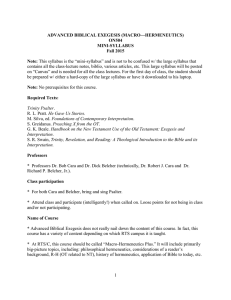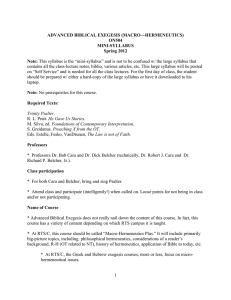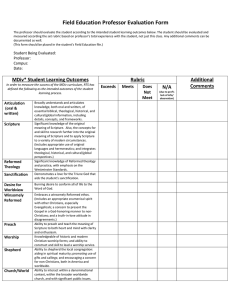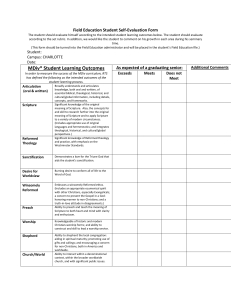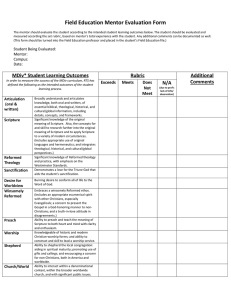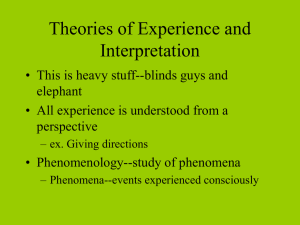on “Self Service” and is needed for all the class... should be prepared w/ either a hard-copy of the large... ADVANCED BIBLICAL EXEGESIS (MACRO—HERMENEUTICS)
advertisement
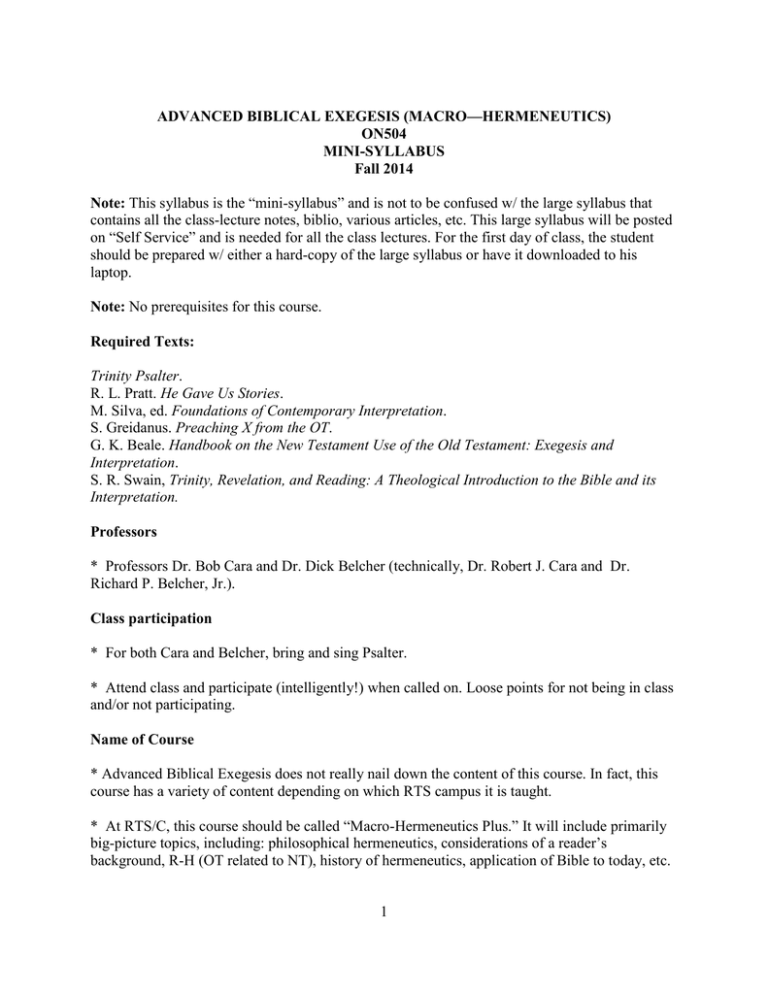
ADVANCED BIBLICAL EXEGESIS (MACRO—HERMENEUTICS) ON504 MINI-SYLLABUS Fall 2014 Note: This syllabus is the “mini-syllabus” and is not to be confused w/ the large syllabus that contains all the class-lecture notes, biblio, various articles, etc. This large syllabus will be posted on “Self Service” and is needed for all the class lectures. For the first day of class, the student should be prepared w/ either a hard-copy of the large syllabus or have it downloaded to his laptop. Note: No prerequisites for this course. Required Texts: Trinity Psalter. R. L. Pratt. He Gave Us Stories. M. Silva, ed. Foundations of Contemporary Interpretation. S. Greidanus. Preaching X from the OT. G. K. Beale. Handbook on the New Testament Use of the Old Testament: Exegesis and Interpretation. S. R. Swain, Trinity, Revelation, and Reading: A Theological Introduction to the Bible and its Interpretation. Professors * Professors Dr. Bob Cara and Dr. Dick Belcher (technically, Dr. Robert J. Cara and Dr. Richard P. Belcher, Jr.). Class participation * For both Cara and Belcher, bring and sing Psalter. * Attend class and participate (intelligently!) when called on. Loose points for not being in class and/or not participating. Name of Course * Advanced Biblical Exegesis does not really nail down the content of this course. In fact, this course has a variety of content depending on which RTS campus it is taught. * At RTS/C, this course should be called “Macro-Hermeneutics Plus.” It will include primarily big-picture topics, including: philosophical hermeneutics, considerations of a reader’s background, R-H (OT related to NT), history of hermeneutics, application of Bible to today, etc. 1 * At RTS/C, the Greek and Hebrew exegesis courses, more or less, focus on microhermeneutical issues. Course Objectives * The overarching purpose is for the student to interact with a variety macro-hermeneutical issues, including Reformed models, to enable the student to better interpret/apply the Bible. * Course objectives as coordinated with MDiv Student Learning Outcomes are shown at the end of this document. Structure of the Course * Cara, first 6 weeks. * Three units: (1) PM vs M w/in a CVT framework. (2) Macro-hermeneutics per se. (3) Review of Cara’s hermeneutical proverbs. * Belcher, second 6 weeks. * Three units: (1) History of interpretation of the Bible: Philo through modern day. (2) NT use of OT, including NT writers’ hermeneutical context. (3) Preaching X from the OT: Typology and Greidanus. * Cara, Belcher, and Kruger 13th week, Covenant Structure of Bible Course Requirements and Grades * Final Test * Test will be ≈ 85-90% verbatim of Lecture Review Questions. The remainder will be miscellaneous questions from the class lectures and readings. * For answers to Lecture Review Questions, you may/should enquire of fellow students in this class. * 40% of grade. * Pratt’s He Gave Us Stories, pages 1-128, 306-402 and Swain’s Trinity, Revelation, and Reading. * Submit a fake (i.e., no or few footnotes) 7-10 page paper that includes: * A statement that student read 100% of Pratt and Swain reading requirement. * Self-consciously evaluate one or more aspects of the student’s interaction w/in his covenant community (both heritage and present) that has (or will have) influenced the student’s macro method of biblical interpretation (e.g., BT/R2 H/ST, preaching theory) or a specific theological topic (e.g., elder roles, Trinity, innerancy) . This influence can be either positive, negative, or both. * The paper should show knowledge of your covenantal community and at least some catetgories from Cara’s lectures and Pratt/Swain books. * Although no research is required, this paper should have a sophisticated understanding of macro-hermeneutics and indicate that the student can “theologize” about himself relative to his theological community. * Paper due on last day of Cara’s lectures (≈ half-way through semester). Give to Cara. 32 f/s/s. * 25% of grade. * Silva, M., ed. Foundations of Contemporary Interpretation. * Read anyone of the books in this book, excepting God, Language and Scripture. * Submit a (fake) 7-10 page paper that includes: * A statement that student read 100% of book w/in the book. * Summarize book (1/3 of paper). * Critique one small or large section in the book (2/3 of paper). The critique should show knowledge of Cara/Belcher lectures and the ability of the student to theologize about hermeneutics. * Paper due on last day of Belcher’s lectures. Give to Belcher. 32f/s/s. * 25% of grade. * Read all of Greidanus’ Preaching X from the OT and all of Beale’s Handbook on the NT Use of the OT. * On final test will be the question, “Did you read 100% of the assigned reading?” * 10% of grade. * Bring and sing Trinity Psalter. * No grade associated with this unless one does not do it! 3 RTS Charlotte Classroom Internet Usage RTS Charlotte recognizes how essential it is for students to have reliable, campus-wide access to the internet. For that reason, we have made wi-fi available for our student body, not only in the library and student lounges, but also in the classrooms. We know that students need to use the internet to download class materials, access files on the Cloud, and to access other important information. However, we also recognize that internet access in the classroom provides opportunity for abuse and misuse. Some students have unfortunately used their internet access to engage in many activities that distract them from the classroom lectures (e.g., surfing the web, checking sports scores, playing games). Not only does such activity hamper a student’s own seminary education, but it distracts other students who can see their computer screens. In addition, donors and classroom guests (who often sit in the back) can see this inappropriate internet usage, which reflects poorly on RTS. So, how can these challenges be addressed? One option is to turn off the internet entirely. But, we recognize that this creates problems for students who use it for legitimate reasons. Thus, we prefer to address this problem by appealing to the integrity of the students as ones who are preparing for a lifetime of ministry to Christ and his church. We are asking each student to take personal responsibility for their behavior in this area and to encourage others around them to do the same. In order to encourage this accountability, and to change the culture of the campus as it pertains to the internet, we are asking each student to sign the pledge below at the beginning of each term. As a pledge, we ask you to sign with integrity and with an honest desire to keep it. “On my honor as a student at Reformed Theological Seminary, and as a one preparing for the gospel ministry, I pledge that I will use the internet in the classroom only for appropriate classrelated activities.” Signed:___________________________________________________ Date: _____________________________________________________ 4 Course Objectives Related to MDiv Student Learning Outcomes With Mini-Justification Course: Professor: Campus: Date: ABX/Macro-Hermeneutics Robert J. Cara and Richard P. Belcher Charlotte Fall 2014 MDiv Student Learning Outcomes Rubric Broadly understands and articulates knowledge, both Articulation (oral & written) oral and written, of essential biblical, theological, Moderate historical, and cultural/global information, including details, concepts, and frameworks. Scripture Reformed Theology Sanctification Significant knowledge of the original meaning of Scripture. Also, the concepts for and skill to research further into the original meaning of Scripture and to apply Scripture to a variety of modern circumstances. (Includes appropriate use of original languages and hermeneutics; and integrates theological, historical, and cultural/global perspectives.) Significant knowledge of Reformed theology and practice, with emphasis on the Westminster Standards. Demonstrates a love for the Triune God that aids the student’s sanctification. Burning desire to conform all of life to the Word of God. Winsomely Reformed Embraces a winsomely Reformed ethos. (Includes an appropriate ecumenical spirit with other Christians, especially Evangelicals; a concern to present the Gospel in a God-honoring manner to non-Christians; and a truth-in-love attitude in disagreements.) Ability to preach and teach the meaning of Scripture to both heart and mind with clarity and enthusiasm. Worship Moderate Minimal Desire for Worldview Preach Moderate Strong Knowledgeable of historic and modern Christianworship forms; and ability to construct and skill to lead a worship service. 5 Strong Moderate None Mini-Justification 1. Submits one self-reflected hermeneutics paper. 2. Submits one critical book review. 3. Significant overview of the history of hermeneutics, both in the church and philosophy, is included. 1. Scriptures’ interpretation of Scripture is included. 2. Scriptures’ understanding of “meaning” is evaluated. 1. Overview of Reformed view of General and Special Revelation. 2. Reformed hermeneutics. 3. History of Reformed denominations. 4. Swain book includes historical Reformed hermeneutics 1. Psalm singing in class 2. Self-reflection paper. 1. The Bible is the ultimately authority of hermeneutical questions. 2. Student’s background affects hermeneutics. 1. The ethos of RTS is presented and evaluated as to how that affects hermeneutics. 1. Section of hermeneutics of “modern meaning.” Shepherd Church/World Ability to shepherd the local congregation: aiding in spiritual maturity; promoting use of gifts and callings; and encouraging a concern for non-Christians, both in America and worldwide. Ability to interact within a denominational context, within the broader worldwide church, and with significant public issues. 6 Minimal Strong 1. Understand one’s own background is an aid to understanding others. 1. Overview of theological traditions (Reformed, Lutheran, RC, EO). 2. Creed discussions. 3. Philosophical hermeneutics. 4. Modernism vs Post-Modernism.
